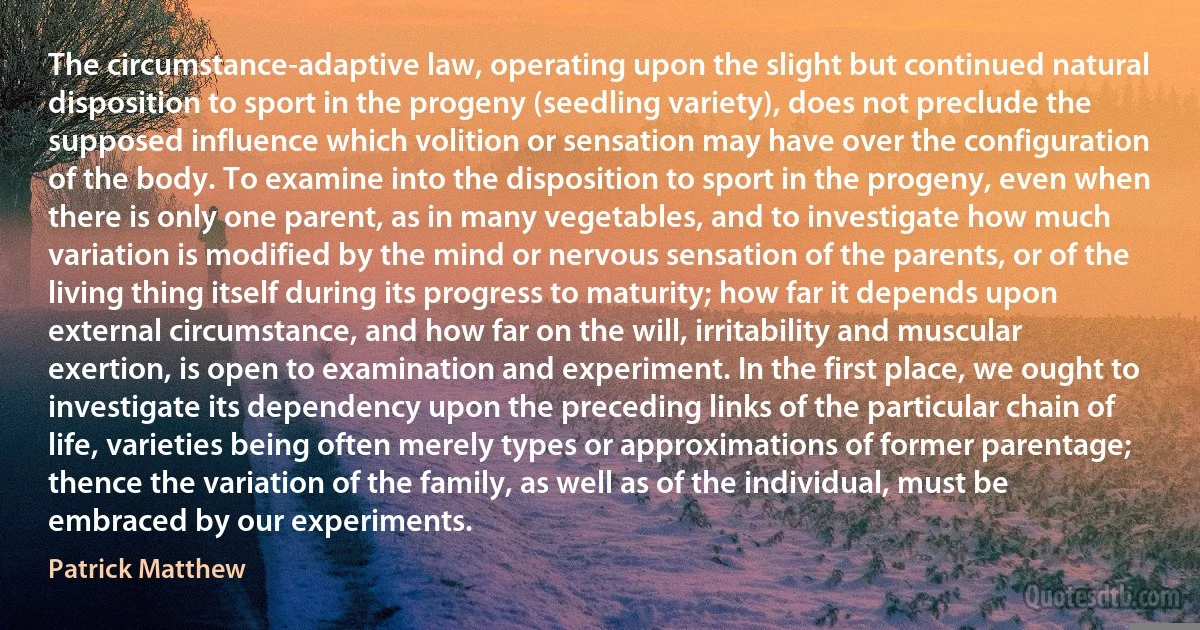Patrick Matthew quotes
There is a law universal in nature, tending to render every reproductive being the best possible suited to its condition that its kind, or organized matter, is susceptible of, which appears intended to model the physical and mental or instinctive powers to their highest perfection and to continue them so. This law sustains the lion in his strength, the hare in her swiftness, and the fox in his wiles. As nature, in all her modifications of life, has a power of increase far beyond what is needed to supply the place of what falls by Time's decay, those individuals who possess not the requisite strength, swiftness, hardihood, or cunning, fall prematurely without reproducing - either a prey to their natural devourers, or sinking under disease, generally induced by want of nourishment, their place being occupied by the more perfect of their own kind, who are pressing on the means of subsistence.

Patrick Matthew
Darwin's reply: I freely acknowledge that Mr. Matthew has anticipated by many years the explanation which I have offered of the origin of species, under the name of natural selection. I think that no one will feel surprised that neither I, nor apparently any other naturalist, has heard of Mr. Matthew's views, considering how briefly they are given, and that they appeared in the Appendix to a work on Naval Timber and Arboriculture. I can do no more than offer my apologies to Mr. Matthew for my entire ignorance of his publication.

Patrick Matthew
The self-regulating adaptive disposition of organised life may, in part, be traced to the extreme fecundity of Nature, who, as before stated, has, in all the varieties of her offspring, a prolific power much beyond (in many cases a thousand-fold) what is necessary to fill up the vacancies caused by senile decay. As the field of existence is limited and pre-occupied, it is only the hardier, more robust, better suited to circumstance individuals, who are able to struggle forward to maturity, these inhabiting only the situations to which they have superior adaptation and greater powers of occupancy than any other kind; the weaker, less circumstance-suited, being prematurely destroyed.

Patrick Matthew
There is more beauty and unity of design in this continual balancing of life to circumstance, and greater conformity to those dispositions of nature which are manifest to us, than in total destruction and new creation... [The] progeny of the same parents, under great differences of circumstance, might, in several generations, even become distinct species, incapable of co-reproduction.

Patrick Matthew
Geologists discover... an almost complete difference to exist between the species or stamp of life, of one epoch from that of every other. We are therefore led to admit, either of a repeated miraculous creation; or of a power of change, under a change of circumstances, to belong to living organised matter, or rather to the congeries of inferior life, which appears to form superior.

Patrick Matthew
In your number of March 3rd [1860] I observe a long quotation from The Times, stating that Mr. Darwin "professes to have discovered the existence and modus operandi of the natural law of selection," that is, "the power in nature which takes the place of man and performs a selection, sua sponte," in organic life. This discovery recently published as "the results of 20 years' investigation and reflection" by Mr. Darwin turns out to be what I published very fully and brought to apply practically to forestry in my work Naval Timber and Arboriculture, published as far back as January 1, 1831, by Adam & Charles Black, Edinburgh, and Longman & Co., London, and reviewed in numerous periodicals, so as to have full publicity in the "Metropolitan Magazine," the "Quarterly Review," the "Gardeners' Magazine," by Loudon... and repeatedly in the "United Service Magazine" for 1831, &c. The following is an extract from this volume, which clearly proves a prior claim. [excerpt follows].

Patrick Matthew
Matthew's response: To me the conception of this law of Nature came intuitively as a self-evident fact, almost without an effort of concentrated thought. Mr Darwin here seems to have more merit in the discovery than I have had; to me it did not appear a discovery. He seems to have worked it out by inductive reason, slowly and with due caution to have made his way synthetically from fact to fact onwards; while with me it was by a general glance at the scheme of Nature that I estimated this select production of species as an a priori recognisable fact – an axiom requiring only to be pointed out to be admitted by unprejudiced minds of sufficient grasp.

Patrick Matthew

